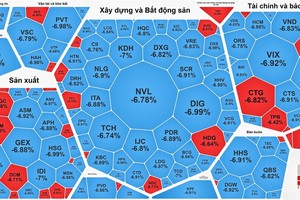According to the report, from mid-March, the export orders of garment and textile enterprises were continuously canceled, suspended, and temporarily halted, leading to a shortage of jobs in April and May this year.
The larger the brand is, the higher the reduction ratio is and there is no sign of recovery. This situation leads to high pressure on garment and textile enterprises in terms of both finance and labor. If there is no policy adjustment, many enterprises may lose liquidity by the end of April this year. The unemployment rate will be from 30 percent to 50 percent in April and May this year, according to the Vinatex.
The estimated loss of Vietnam’s garment and textile industry will be up to above VND5 trillion if 30 percent of workers are unemployed in April and 50 percent of workers are unemployed in May. If the situation lasts longer, the industry will lose up to VND3 trillion every month.
Besides, the industry has been importing around US$1.5 billion worth of raw materials every month. If 20 percent of orders are canceled, $300 million worth of raw materials will not be used that might become inventories that are difficult to circulate.
It is estimated that the total inventory in April and May this year of the industry will lose 50 percent of the value, equivalent to around $300 million. Vinatex alone will lose about $24 million.
The Vinatex assumed that if the Covid-19 pandemic ends at the end of May and the economy recovers from June this year, it is estimated that Vietnam’s garment and textile industry will suffer a loss of VND11 trillion and the group will lose around VND1 trillion.
In the meeting on March 25, the Vinatex asked its members to seek opportunities to produce export products for the prevention of the disease, such as face masks, medical clothes using antimicrobial fabrics, and single-use clothes from nonwoven fabrics; apply a flexible working regime, reduce working hours to around 32 to 40 hours per week after reaching an agreement with workers; reduce expenses, delay investment; ask for exemption or delay of the payment of social insurance, unemployment insurance, and union dues.
The group will propose the National Assembly, the Government and relevant ministries and departments to allow the export of face masks and clothes for the prevention of the disease; ask the State Bank of Vietnam and commercial banks to extend loans.
The larger the brand is, the higher the reduction ratio is and there is no sign of recovery. This situation leads to high pressure on garment and textile enterprises in terms of both finance and labor. If there is no policy adjustment, many enterprises may lose liquidity by the end of April this year. The unemployment rate will be from 30 percent to 50 percent in April and May this year, according to the Vinatex.
The estimated loss of Vietnam’s garment and textile industry will be up to above VND5 trillion if 30 percent of workers are unemployed in April and 50 percent of workers are unemployed in May. If the situation lasts longer, the industry will lose up to VND3 trillion every month.
Besides, the industry has been importing around US$1.5 billion worth of raw materials every month. If 20 percent of orders are canceled, $300 million worth of raw materials will not be used that might become inventories that are difficult to circulate.
It is estimated that the total inventory in April and May this year of the industry will lose 50 percent of the value, equivalent to around $300 million. Vinatex alone will lose about $24 million.
The Vinatex assumed that if the Covid-19 pandemic ends at the end of May and the economy recovers from June this year, it is estimated that Vietnam’s garment and textile industry will suffer a loss of VND11 trillion and the group will lose around VND1 trillion.
In the meeting on March 25, the Vinatex asked its members to seek opportunities to produce export products for the prevention of the disease, such as face masks, medical clothes using antimicrobial fabrics, and single-use clothes from nonwoven fabrics; apply a flexible working regime, reduce working hours to around 32 to 40 hours per week after reaching an agreement with workers; reduce expenses, delay investment; ask for exemption or delay of the payment of social insurance, unemployment insurance, and union dues.
The group will propose the National Assembly, the Government and relevant ministries and departments to allow the export of face masks and clothes for the prevention of the disease; ask the State Bank of Vietnam and commercial banks to extend loans.
























